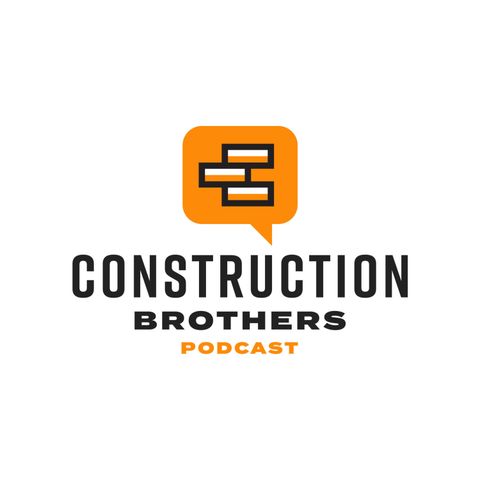To Buy or Not To Buy, That Is the Question (ft. Rob Coakley)

Download and listen anywhere
Download your favorite episodes and enjoy them, wherever you are! Sign up or log in now to access offline listening.
Description
Check out https://www.quickbase.com/trial-register?utm_source=google&utm_campaign=HI_Brand_USA&utm_medium=Paid-Search&utm_content=Quickbase-Concat&utm_term=quick%20base&gad_source=1&gclid=Cj0KCQjw0_WyBhDMARIsAL1Vz8tlMazQ50NxMqiftLk8fNBEk7uVbbTDA4e_3c78TdU5yy1AGC1l3EMaAioeEALw_wcB to learn more about the tools discussed in this episode. 00:00 - Introduction Rob Coakley is the equipment manager at Lithko Contracting. He’s here today to discuss...
show more00:00 - Introduction
Rob Coakley is the equipment manager at Lithko Contracting. He’s here today to discuss a decision familiar to every construction business owner: to rent or to buy.
Rob shares some of Lithko’s history in order to set the stage for the complexity of the rent/buy decision. It boils down to this: Having a capital constraint along with a scalability issue put Lithko on the path toward rentals–more out of necessity and a desire for simplicity than to save money.
Managing rentals on a large scale involves a hefty amount of record-keeping and management. Lithko brought Rob on board to make the end cost of equipment a competitive advantage. He explains how many contractors who own equipment will bury equipment costs in order to win jobs. This often leads to financial trouble in the long run.
06:21 - Conventional wisdom (or at least preference)
Eddie describes the conventional contractor approach to tool acquisition: If I can put it in the job and buy the tool, I’m going to buy the tool. This often leads to tools sitting in the weeds.
Rob follows up on this and points out that an owned tool can become part of the landscape of a job while the pace of progress slows, whereas being on a rental timeline can motivate you to keep the project moving along. That clock doesn’t stop ticking. He also explains that ownership does actually make sense for many smaller contractors. It’s when your business scales up that the argument grows stronger and stronger for renting–even to the point of renting everything.
We discuss why GCs hire specialty contractors. Rob then discusses how he talks to owners of companies that Lithko acquires. He lays out a rental-based approach to pricing projects. If it can be done without eating into profits, then there’s no reason not to rent. Your long-term risk drops significantly.
13:05 - Record-keeping when scaling up
Eddie asks Rob to explain how he and his team at Lithko has handled the increasingly complex task of record-keeping as they’ve grown.
Lithko has grown from a $135-million business in 2008 to a $1.8-million business last year. With this growth came information-management challenges. Rob explains that you need to know what your cost will be at the end of the job and where you are today. That gap, of course, determines whether or not you're profitable.
When Rob began investigating solutions for the scaled-up version of this process, he found that Quickbase was a handy no-code/low-code solution for building the customized software he needed. He compares it to Lego kits and sand-castle building.
We discuss the importance of mastering project timelines in order to optimize the scheduling of rented equipment.
22:15 - Lithko’s Quickbase sand castle
Eddie asks Rob to run through some of the components that are most important to their customized Quickbase management package. Rob explains that they’re always short-term planning. It’s all about well-thought-out reports and dashboard items. He explains how they use the dashboards to allow record-keepers and managers to easily. This includes selectively sharing access with vendors so they can participate in the bidding process.
Rob shares about safety compliance components and the mobility features that enable decision-makers to access the data needed for decisions made in the field. He explains how data from their ERP system is integrated and discusses incident tracking.
We discuss equipment breakdowns and maintenance records for owned equipment. Rob walks through the process of bids, sourcing, and reliable equipment-sourcing relationships. He lists the numerous pieces of data that work together to determine project costs.
47:15 - The impact
Eddie asks about the bottom-line impact of this Quickbase-based system. Rob explains that information from past projects informs talks with vendors and enables his team to deepen their relationships. All of these things together have resulted in Lithko cutting their bottom-line equipment costs in half since 2007.
01:00:50 - Megaphone Message
Rob encourages everyone to be open to change–whether that’s a new process or a new tool. Whatever role you serve within your company, be ready to accept change. It’s the only way you’re going to grow.
Find Rob on LinkedIn
Check out the partners that make our show possible.
Find Us Online: BrosPodcast.com - LinkedIn - Youtube - Instagram - Facebook - TikTok - Eddie's LinkedIn - Tyler's LinkedIn
If you enjoy the podcast, please rate us on Apple Podcasts, Spotify, or wherever you listen to us! Thanks for listening!
Information
| Author | Tyler Campbell |
| Website | - |
| Tags |
-
|
Copyright 2024 - Spreaker Inc. an iHeartMedia Company
